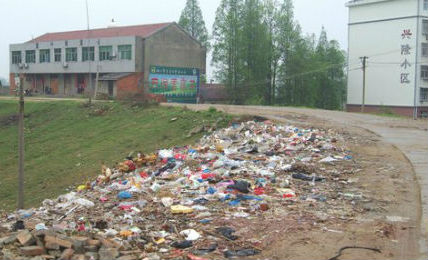
Waste is dumped in an open space alongside a road in a village in China.
Piles of refuse containing everything from food waste to animal feces to plastic packaging are all too common a sight around China's villages and farmland.
Preliminary studies estimate that the country's rural areas produce up to 300 million tons of garbage a year, but an effective and environmentally conscious way to deal with the waste has yet to be implemented.
"Boss Liu's pig farm is behind the river. Carrying the excrement of hundreds of pigs, all the polluted water is directly discharged into the river. It's a little better in winter, but during summer we don't even dare open the windows," says Zhu, who lives in Sanyou, a village located in Wujiang of Zhejiang Province.
Because rural residents don't always know how to dispose of garbage properly, they may simply dump their waste in a hole, a ditch or even in open spaces alongside roads and rivers. Some also burn or bury potentially toxic wastes, resulting in contamination of soil, air and groundwater.
"The public has no awareness about reducing waste or sorting recyclable materials," Zhang Houhu, a researcher at the Nanjing Institute of Environmental Sciences, explained during an interview with Shanghai's First Financial Daily.
Garbage from urban areas has worsened the situation. Statistics show that about 85 percent of the waste produced by city dwellers winds up buried in the countryside.
Beijing's 20 million people produce 23,000 tons of waste each day, equivalent to the weight of nine full Olympic-size swimming pools. As a result, Tongzhou, located in the capital's outskirts, was for years the site of illegal dumps.
The redolent piles eventually sparked a media outcry, and in 2010 the government invested 10 billion yuan (US$1.6 billion) in a cleanup campaign to tackle illegal landfills and build new facilities.
Yet not all villages are so lucky, especially since many rural governments are heavily dependent on industrial production and choose to turn a blind eye to the toxic byproducts.
"Before, the water was clear, but now it smells bad because of pollutants from dozens of nearby chemical plants. Government officials are bent only on profits. No one cares about smelly water and garbage. It's everywhere," says Pan, a farmer in Yixing, Jiangsu Province.
Rural waste is becoming a serious environmental and human health problem due to inadequate sanitation facilities and weak environmental protection enforcement, writes the China Environmental Health Project.
Moreover, without sufficient funding, the high cost of moving garbage from its sources to landfills has prevented such facilities from being built in the countryside, adds the First Financial Daily.
Pilot garbage disposal projects have been established in some rural regions, but they often simply bury the waste without trying to eliminate the environmental and health hazards.
Experts in the waste management industry have pushed for programs to encourage waste sorting, recycling and local processing. In one successful example, garbage cans were set up in some villages in Shandong as part of a plan that charges residents for waste treatment.
Another potential option is the landfill-to-energy program, which could "kill two birds with one stone" by addressing two pressing rural challenges—an abundance of garbage and a shortage of energy.

Copyright ©1999-2011 Chinanews.com. All rights reserved.
Reproduction in whole or in part without permission is prohibited.